Over the past five years, Colorado’s Democratic trifecta has produced a cascade of legislation on climate, energy, housing, and land use (among other things). In this episode, we dive into some of these achievements and the politics behind them with Gov. Jared Polis and his top climate policy advisor (and previous Volts guest) Will Toor.
Text transcript:
David Roberts
One political point I make to anyone who will listen is this: if you want to understand the values and goals of the Democratic Party, turn your attention away from dysfunctional reality show that is federal politics and look instead to states. Specifically, look to the states where Democrats have a trifecta (control of the governorship and both houses of the legislature). That’s where Republicans are unable to block them. What do they do when they have control?
My favorite example of Democratic control in action — well, maybe tied with Minnesota — is Colorado. It’s out there in the middle of the country, not on the coasts where most journalists live, so it doesn’t get much national attention. But over the last five years or so, Democrats in Colorado have been on an absolute legislative bender, passing bill after bill on climate, energy, and housing (among other things). I can barely keep track.
The most recent win was a package of land-use bills that passed a few months ago, which would do things like require municipalities to upzone around transit corridors, limit local parking requirements, and allow accessory dwelling units (ADUs) on all residential properties. It wasn’t everything YIMBYs wanted, but it was a lot.
To dig into these reforms and the politics that make them possible, today I’m talking to Colorado Gov. Jared Polis and his top climate policy advisor (and previous Volts guest), Will Toor. We’re going to cover some of the highlights, address some of the objections, and look to what’s next.
With no further ado, Governor Jared Polis, welcome to Volts. Thank you so much for coming. It's a real honor.
Governor Jared Polis
David, thanks for having me on the show.
David Roberts
And Will, good to talk to you again. Always good to talk to you.
Will Toor
It's great to be on the show today.
David Roberts
So, Governor, I want to get to the land use stuff because that's the really juicy stuff. But I want to start first with climate. So back in 2019, Colorado passed this big climate roadmap, set forth a bunch of targets, a bunch of policies, and part of that package was a sort of commitment to, "We're going to check our progress, periodically." And a lot of like, not just long-term 2050 goals, but real interim targets, too. There's a 2040 goal, there's a 2030 goal. There's even a 2025 goal. Of course, the downside of accountability is if you're not on track, everybody knows it.
And so, this past year, you did a big assessment, did a climate roadmap 2.0, and what it shows is you are not quite on track to hit the 2025 goal, and then it's got a bunch of recommended actions to get to the 2030 goal. But even those recommended actions added up don't quite get to the 2030 goal either. How are you thinking about your progress? Is that disturbing to you that you're off track, or do you feel good about where you are?
Governor Jared Polis
Sure. And we'll be talking about land use as climate policy. How you use the land and how people get where they want to go is a key part of it. So, we will be at 95% of the goal for 2030, and that's without a lot of the measures that we haven't modeled yet. And that includes, for instance, the land use, the transit piece that aligns with the land use, which we feel will help us achieve the goals. So, we always report on the fact that, yes, we need more policies and new policies to get where we want to go, but the big achievements around transit and land use are going to be absolutely critical about reaching those 2030 goals.
David Roberts
So you feel good about hitting the 2030 goal right now? You feel confident that you will hit it?
Governor Jared Polis
Yeah, I mean, I can't say we won't need any new policies in the next couple of years. In fact, one of the hot areas, David, is going to be the siting of renewable energy. Maybe we'll get into that. But I do feel we need some more juice around siting because of the challenges that that has been facing increasingly. So, yeah, I mean, look, we always want to make sure we have the tools to achieve our goals, and I'm confident we're on the right track. And we're one of the first states, for instance, to implement point-of-sale refunds for electric lawn mowers, electric leaf blowers.
People save $300-$400 right at the point of sale. It's increased sales substantially at all of our major hardware stores.
David Roberts
Interesting. You know, it's funny, I threw it out on Twitter that I was going to be talking to you to solicit questions. And I swear, probably half the questions I got were about the e-bike, were about the electric bike rebate program, which is, as far as I know, unique to Colorado. Is that just like, you know, this is not, I think, one of the main planks, but it is interesting. Have you learned anything from the e-bike program? Like, how's that going?
Governor Jared Polis
Yeah, it's one of several. Right. So, we have, you know — if we just did e-bikes and nothing else, you're right, it would be like, "What?" But it's absolutely part of it. If people can ditch their second car and have one e-bike for regular commuting and one car, rather than two for weekend journeys and excursions. But along with the electric vehicle tax credit, up to $7,500 in our state.
David Roberts
Additional to the federal.
Governor Jared Polis
On top of federal, stackable. And then, yes, the e-bike tax credit, $450. That can be effectively a third off, 40% off an e-bike.
We'll talk about some of the early indications we've seen, including the pilot that we did before we rolled this out.
Will Toor
Yeah, we are seeing, I think, great success with the e-bike rebate and the statewide e-bike tax credit program. This, I would have to say, is one of the programs that people just absolutely love and probably get more people reaching out about how happy they are about our e-bike programs than anything else that we do. So, we did a $12 million program, e-bike rebates, primarily targeted at low-income Coloradans, and basically, people just snatched them up. So, around 10,000 people got e-bikes through that program. But then, we just this year launched a universal e-bike tax credit program where anybody who is a Colorado resident can get up to one bicycle a year and they will get $450 off at the point of sale.
And we have more than 100 bike shops across the state that are participating. We won't have the data from that one until the end of the year. But the anecdotal information suggests that e-bikes are just flying out of the bike stores. Super important, not just for the bikes themselves, but as we move towards much denser and more transit-oriented land use, having thousands of e-bikes out there is just going to be really useful for supporting those land use changes.
Governor Jared Polis
And I would just add one more thing, David, incorporated in our Colorado Department of Transportation planning, and you might have seen — as you mentioned, we're not on the coast. It's a big deal when The New York Times even notices Colorado — so about a month or two ago, they did a front-page article on what the work our Colorado Department of Transportation is doing, namely looking at the carbon impact of projects. Meaning, we are now including more bike lanes. We're adding designated lanes where we can. So all of the planning around making Colorado more bikeable, more walkable, as well as transit is a key part of where we're going.
At the same time, pairing that with ways to make e-bikes, in this case, more affordable for people.
David Roberts
Yeah, this is a real cutting-edge policy because I think, legendarily, state departments of transportation are, let's say, lagging indicators on decarbonization. So, a couple of states now have explicitly sort of tied carbon goals into Department of Transportation planning. I think it's you, and Minnesota, and maybe Michigan; I could be making that up. But to me, that's like — that and the e-bike thing are sort of two pioneering things that I feel like other states should be paying some attention to.
Governor Jared Polis
And they go together, David, because you want the use case for bikes and e-bikes to be usable, right? So, you got to have the protected lanes, you got to have the access. Now, that piece doesn't happen in a second. It happens over a period of years, but it's already happening. For instance, a project on 119 near where I live, between Boulder and Longmont, is adding a protected bike lane. And by the way, that's also an important safety improvement, as well as a way of encouraging people to be able to use e-bikes and bikes to get to work and get where they want to go.
David Roberts
One of the notable features of Colorado that I'm not sure people really understand is that there's quite a bit of oil and gas production there. So, Colorado faces, I think, a problem that is familiar to many jurisdictions these days, including the United States as a whole, which is trying to decarbonize on one hand, and then having a large and powerful invested fossil fuel industry on the other hand and the tension between those. Colorado recently, you recently came to a sort of grand bargain with the state oil and gas industry. And I've been reading around and, like, depending on who you read, it's either sort of this pioneering way of making peace between these two ancient enemies and moving forward, or it's a horrendous sellout.
Tell us about the substance of the deal, sort of like, what was the impetus to make that deal and what is in that deal, and how are you kind of thinking about it?
Governor Jared Polis
I'm going to answer that in a moment directly, Dave, but I want to talk about another sort of benefit of Colorado being a traditional oil and gas permitting state. We know how to permit underground activity and underground stock.
David Roberts
Oh, we're going to get to geothermal, Governor. Don't you worry.
Governor Jared Polis
Okay, good. So, we were able to really pivot and adapt our regulatory structure to facilitate these other areas. We'll get to that in a minute. What we focused on with this oil and gas agreement is really that the oil and gas funds — the fees that originate per barrel, they've traditionally generated a severance tax — this is a fee, will effectively help fund carbon mitigation. And that takes a couple of main forms. The most substantial of which is transit. Right. Giving people the opportunity with passenger rail as well as rapid bus transit, and then as well as funding our natural landscapes and effectively carbon mitigation with Colorado Parks and Wildlife on our public land management side, including additional conservation and protecting areas that we love for carbon, but we also love for recreation.
So, that's really what we were able to align. It's to the tune of, you can't model the exact dollar amount because it depends on the level of oil and gas production, but it's in excess of $200 million a year or so. It could be 150, could be 250. But that is really an enormous boost for transit. I read that it actually moved Colorado from being the 42nd lowest state in funding transit to being around the 20th state.
David Roberts
Just that one fee on the oil and gas.
Governor Jared Polis
Just that one deal. Yeah.
David Roberts
Interesting. And, yeah, and they're also, I think they also agreed to take more measures to cut ground-level ozone, something like that?
Governor Jared Polis
Yeah, exactly. So, that was also some air quality pieces, both codifying some of the things we had in rule to put them in law, but also accelerating them and really putting best practices around monitoring in law so that we can continue to make sure that in addition to supporting the mitigation in the form of transit and public land restoration and conservation, we also can continue to reduce the emissions from the industry itself.
David Roberts
So that's kind of what you got from them. What did they get from you?
Governor Jared Polis
They exist in our state and they're here. Right. So, I mean, as long as — and the way I look at it, David, I don't know how you look at it. I mean, as long as people are consuming oil and gas, I said, "Well, we want to phase and transition away from that, for instance, electric vehicles." But as long as it's being consumed, we as a planet would rather that be the most carbon-efficient form of oil and gas. And so, yes, oil and gas products produced in Colorado are going to have a much lower carbon emission profile than produced in Saudi Arabia or produced in other parts of the world, Iran.
Also, without the geopolitical complexities, as we rapidly transition to the renewable energy and electric economy, we can also make short and medium-term gains by reducing the carbon profile of the carbon fuels, the legacy carbon fuels that we use during this period.
David Roberts
And the other thing that you got from them, or Colorado got from them, I don't know, the world got from them. My understanding is they were planning to put a bunch of ballot measures on the ballot this season that would have rolled back a bunch of your climate measures, and that would have been a big, unnecessary fight.
Governor Jared Polis
And there was some clever marketing there. Will, you want to talk about the kind of pernicious — what do they call it? "Consumer choice," or whatever they called it?
David Roberts
They call everything that.
Will Toor
Exactly. So, this was framed around consumer choice and energy, but what it would have done was really roll back our ability to support electric vehicles, to support electric heat pumps. Depending on how broadly you interpreted it, it could have been a threat to some of the work on renewable energy and just would have thrown a big wrench into our ability to make progress on our climate goals.
David Roberts
So, they agreed not to do that. And my understanding is that you agreed no additional regulations on oil and gas through 2028. Is that accurate?
Governor Jared Polis
We wanted to provide the regulatory certainty if there's going to be significant capital investments made to meet our emission reduction goals, which they are. I think the industry, from their perspective, has to say, "Hey, we have to justify to our CEOs, our bosses, we're sinking hundreds of millions of dollars into Colorado to meet these goals. How do you know we're not going to change them entirely in another year?" So, we wanted to provide that regulatory certainty for the investments that are needed to improve our air quality and reduce carbon emissions, as well as create this funding mechanism to help further offset the carbon emissions and leading to funding of transit, as well as conservation of wild areas.
David Roberts
The one kind of fly in the ointment with this deal that several people have pushed me to ask about is this Suncor refinery. That's, as I understand it, just north of Denver, very dirty. The air around it is very dirty. The community around it suffers a bunch of health issues. And my understanding is that part of this deal is that there's not going to be any additional air quality regulations or any additional, basically, action against that refinery. How do you think about that? Is that just a price to pay for all the things you got?
Governor Jared Polis
Well, there's a whole chapter to be written about Suncor and oil refineries. The short answer is there are a lot of actions that are currently being undertaken, some of which I agree with, some of which I don't agree with. We might get into, for instance, the reformulated gasoline discussion, which actually increases the local emissions at the Suncor site, and there's very little net benefit. It's kind of an artifact of the legacy Clean Air Act, federally, that should be updated. But no, I mean, Suncor is a complex regulatory environment, both state and federal. They're being sued. They're suing us. The feds —
I can't remember everybody suing everybody at any given time. And I, honestly, it's hard to keep track of it all. But no, there's ongoing work there. And again, we would focus on real, tangible improvements, not some of these side distractions that are sometimes also at issue there. But obviously, David, as long as we rely on oil and gas, and that's part of our economy, it needs to be refined somewhere. I mean, that's kind of an obvious fact. And again, I would approach it similarly to how we approach oil and gas extraction. We want to make sure, while we are transitioning as quickly as possible, that oil and gas refineries operate in as climate-efficient a way as possible.
And, in fact, they're meeting very aggressive goals under — Will, is it GEMM 1 that they're under, or what is the technical name of what they're under?
Will Toor
They're under what's called our GEMM 2 rule, which is a requirement that manufacturing facilities in the state need to reduce GHG emissions 20% overall by 2030.
David Roberts
Governor, let's talk about geothermal. Here at Volts, we are big geothermal fans, and to my knowledge, you're sort of like the most — Colorado, and you personally are the kind of the sort of most geothermal forward state that I'm aware of. You've taken a lot of action on this. So, tell me a little bit about why Colorado's interested in geothermal and what you're doing in terms of regulations and grants to encourage it.
Governor Jared Polis
So, first of all, you can call up kind of a heat map. You can google this and very quickly say, "geothermal resources USA map," and you'll see that effectively, they're more aligned with the western United States. So this is why I pursued this initiative as chair of the Western Governors Association. While, of course, there actually are opportunities everywhere, especially for passive heat and cooling and a few selective opportunities for deep well geothermal electric. They exist in spades across the west, and you already see geothermal electric as part of the mix in California, in Utah, Nevada. Hawaii has the highest percentage, over 20%, because of their Kona geothermal electric plant.
And we have some exciting legacy projects in Colorado. For instance, the community swimming pool in Salida is heated through geothermal. But what we really want to do is, there's a whole new set of technologies, and many of them, we talked about Colorado's oil and gas sector. You know, drilling for different purposes is drilling. And so what we did is, first of all, we created an expedited regulatory framework around two things: Deep well geothermal, and then carbon sequestration, deep well carbon sequestration. So we really look at those through what used to be called, when I became governor, the Colorado Oil and Gas Commission.
We retitle them and repurposed them. They're now the Energy and Carbon Management Commission. So, they use their expertise for underground activity to create a predictable, workable way to permit deep well geothermal and deep well carbon sequestration. At the same time, we wanted to juice and accelerate that development in Colorado, so we rolled out a series of geothermal grants. I was just in, and, you know, this is a world-famous town, Vail, Colorado. I'm sure you and your listeners have heard of Vail. So, for instance, in the whole pavilion area by their library and ice skating rink, they are shifting over to geothermal heating and geothermal snow melt.
You know, snow melt is, they traditionally use natural gas. V ery, very energy-intensive endeavor in a cold environment like that. And we also provided sort of seed-level grants for three geothermal electric projects. These are large projects, but they've had to show us to get the grants that they penciled out, that they're workable. I'm hopeful that at least one, hopefully two, will come to fruition — maybe all three, if we're lucky. And then we also have geothermal tax credits that we'll be allocating. Will, do you want to talk a little bit more about that process and the excitement around geothermal in Colorado?
Will Toor
Yeah. So this spring, we opened up our first round of our geothermal grants and had kind of an overwhelming response. We ended up providing —
David Roberts
Can I interject, Will? Is this grants for geothermal electricity production or geothermal like, shallower geothermal heating or both?
Will Toor
So, it's both. We have both grants and tax credits for geothermal heating and cooling, both for single structures and for big thermal energy networks. And we have grants that are basically planning grants and sort of initial drilling, test drilling grants on the electricity side. And then we are, this year, rolling out production tax credits and investment tax credits for the actual geothermal electricity production. So, we had just folks from all over the state who were interested. We ended up funding 33 different projects. We're going to do another round of the grants, and we think that we're going to see a lot of interest in the tax credits as those are rolling out.
The tax credits are a little bit larger, and they can support, I think, really large-scale deployment of the thermal energy networks as well as the actual large-scale deployment of the geothermal electricity.
David Roberts
It would be cool for Colorado to become a geothermal capital of the United States. B e yet another reason for me to move there.
Governor Jared Polis
That's absolutely a goal. We're excited about it everywhere, David. We're excited about it. I visited Utah, and they're developing some deep well geothermal there. We did a number of events across the west with the Western Governors Association. But yes, of course, we're excited here. And I would compliment again, the Biden administration. A lot of work at the Department of Energy. They have very aggressive goals around geothermal as well.
David Roberts
You mentioned in the context of geothermal, you have tweaked some regulations to make permitting easier. This, of course, opens up the entire subject of permitting, which is a hot topic in energy these days. Back on the federal agenda, there's another permitting bill floating around, and this, of course, is a matter of great angst to clean energy people, because the whole process of — all the bureaucracy seems slow. The permitting, there's NIMBY resistance, there's environmental review that takes forever. There are all these choke points and, you know, places where people can stop things. It's difficult to build things. Nobody's building as fast as they need to, et cetera, et cetera.
And I know this is an issue in Colorado, just like it is everywhere else, sort of like farmers in northwest Colorado now are fighting back against wind farms, much to the frustration of wind advocates. I'm just sort of curious what you think about that whole nest of issues, whether you've addressed it yet or whether you have something in mind, an approach in mind.
Governor Jared Polis
Well, first of all, many of our agriculture communities, farmers, and ranchers, have long had energy as one of their income streams. It could be in the form of oil and gas if they're lucky enough to own the mineral rights. If not, it could be somebody for a pipeline across their property. And then more recently, solar and wind. We actually have been very supportive of efforts to show the way that the two could exist together. And we support agrivoltaic pilot projects to show how, in fact, solar panels can be consistent with production ag and actually increase production of partially shaded crops and retain soil moisture.
Wind is also consistent with many of these. Transmission is another piece. You didn't mention it, but I will. We absolutely need increased transmission, including across private lands, to be able to achieve our renewable energy goals. So this looms large on our minds, David. We did have an effort legislatively to expedite permitting. It didn't quite make it through, but we did make a lot of progress on the housing side, as we talk about with regard to permitting. But absolutely, we continue to work to make sure that energy production areas are able to produce renewable energy, and we aren't blocked in transmission or renewable generation for other reasons.
David Roberts
How do you think about, I mean, maybe this is just too general of a question, but do you have any thoughts on — obviously the issue here is, on the one hand, you want people to have some local self-determination, you want them to have control over their land, you want them to have some autonomy. But on the other hand, if everybody can say no, nothing ever gets built anywhere. How do you think about the balance of sort of the statewide need for this stuff versus the rights of locals? And obviously this comes back up again in housing, too.
Governor Jared Polis
Will?
Will Toor
I'd be happy to jump in here. I think we're seeing some amazing progress, especially with our electric utilities. It's a little harder to make that transition with our gas utilities. But we, back in 2019, put in place a clean energy plan requirement for 2030 that our electric utilities have to adopt plans that will get to at least an 80% reduction in greenhouse gas emissions. What we're seeing in practice is that many of the utilities are going well beyond that minimum requirement. We've got Holy Cross Energy who are working towards a 100% reduction by 2030. We've got Tri-State Generation and Transmission, a huge cooperative that in the past was one of the most coal-heavy utilities in the country.
That is retiring every coal plant in New Mexico and Colorado by the end of this decade, and they'll achieve about an 89% reduction in their GHG pollution by the end of the decade. We look at all the utilities together, and we're going to be probably somewhere between 85% and 87% reduction by the end of the decade. We actually just did a big study working with consultants Ascend Analytics, looking at 2040 and what is the lowest cost mix of resources to meet our 2040 electric demand, which is going to grow a lot because of electric cars and electric trucks and heat pumps and electrification of industry. And what we found is that we can just continue on this pathway.
We can get to somewhere around 96%, 97% reduction in GHG pollution just by doing the lowest cost mix of resources for customers to meet their demand by basically adding a lot of low-cost wind and solar. That's why we need renewable energy permitting reform. We need to triple the amount of wind in the state and quintuple the amount of solar.
David Roberts
How much of that depends on transmission? New transmission.
Will Toor
We're definitely going to need some new transmission. Right now, we've got some really important transmission being built in eastern Colorado, the so-called "Power Pathway" project that is going to allow us to connect a lot of wind in eastern Colorado and a lot of solar in southeastern Colorado. But we're going to need more. We also are going to need more inter-regional transmission so we can connect into regional markets to the east and to the west. But basically, I would say electric utilities are probably the place where we are seeing the biggest progress on meeting our climate goals.
We're just seeing dramatic reductions in emissions because the low-cost wind, solar, and batteries are both cheaper than the legacy coal. All the coal in the state will be retired by no later than January 1, 2031. And increasingly, what we're seeing is that it's cheaper than operating your gas plants. So, the gas plants are increasingly just becoming a deep capacity resource to back up the renewables.
David Roberts
Right. Side note, have you thought about joining one of those regional markets that you're near to?
Governor Jared Polis
More than joining, we actually have a statutory directive that requires that Colorado join a regional market.
David Roberts
Oh, really?
Will Toor
Yeah. So, there was legislation passed a couple of years ago that requires our utilities to join regional markets no later than 2030.
David Roberts
Oh, interesting.
Will Toor
So, lots of work going on in that right now. A lot of examination and sort of debate about —
David Roberts
What regional market? Does it specify?
Will Toor
It does not specify. So, there's both the potential of looking east into the Southwest Power Pool, and there's been a lot of sort of early movement of a number of utilities that are really looking at the Southwest Power Pool. But there's also the potential, depending on how things shake out, for utilities joining to the west. And obviously, big questions about what happens with Cal ISO.
David Roberts
Really interesting. One other thing about utilities is — this is kind of a niche subject — but Colorado's Public Utility Commission (PUC) is also the subject of some envy from other states who do not have as great PUCs. You actually passed some reforms. Tell me just a little bit about what tweaks or reforms you made to your PUC to help this all along.
Will Toor
So, I can jump in on that. I think the single most important thing was that the governor made some great appointments to the PUC. I mean, it's really about who's sitting in those seats. But we also now have direction that the PUC, in addition to focusing on affordability and reliability, also has achieving our climate goals as part of their mission, and they have equity and environmental justice as part of their mission. So, it just ensures that they're really looking at these issues holistically. But the big thing is that we've just got great people in there.
David Roberts
Governor, let's talk about land use and housing. So, a couple of months ago, or in the past few months, Colorado has passed a big old array of bills addressing this. There's going to be density goals, near transit, going to be accessory dwelling units, removed occupancy limits, trimming back on parking requirements, requiring housing studies. This same big package or a similar big package was sort of on the docket last year and kind of failed at the last minute. And this time it got through. So, I guess the first thing I'd like to hear is just, was it a change in the policies that got that through this time, or has there been a change in the politics?
Governor Jared Polis
Not so much the policies. One thing we changed was the tactics in that instead of one omnibus bill, these changes were in, I think, six or seven different bills. And so they were able to have overlapping coalitions. But when you have an omnibus, sometimes people against one piece of it vote against it. So we were able to get the votes for all the things you mentioned and more from transit-oriented communities allowing multifamily to be built to accessory dwelling units by right, you know, and much more, each in a separate and distinct way. Some of which, I would add, even had attracted bipartisan votes to get them done.
So, this is a key part of affordability in our state. Colorado is a great place to live, but the secret's gotten out. And because of the artificial constraints on supply, basically, we've had what you might call exurban sprawl. People go further and they build further and further out for affordability. And that's not good from a quality of life perspective, first and foremost. Because most people, given the choice, would rather have a five-minute commute than a 40-minute commute. But it's also not good for traffic and congestion, for air quality, or for our carbon profile.
So, we really looked at how we can make living closer to where you work, where you want to shop, where your kids go to school. How can you make that more affordable, lower cost, and remove some of those artificial barriers that prevented the most affordable as well as the most climate-efficient forms of housing from being built in the first place? And we made great progress in removing those barriers.
David Roberts
Yeah, is there a big land use piece that didn't make it? Like, is there a big obvious next land use goal?
Governor Jared Polis
It's really building upon what we've done so they can all be strengthened, they can all grow. But fundamentally, we now allow for multifamily and denser housing near transit. And now we have to deliver on the transit. We talked about how the oil and gas fees help deliver that. We're working on upping our game on transit through our regional transit agencies in the state because you also want to make sure that people have the opportunity to get where they want to go easily and at low cost. So, we put a lot of the basic building blocks in place.
There's a lot more to build on for the next year or two.
David Roberts
One of the things that fell out, particularly that piece that is pushing local municipalities to build densely around transit. One of the pieces that used to be in that was that if they didn't, the state government could withhold tax money from them or sue them to force them to do it. That provision fell out in the face of resistance from the locals. So here we're sort of back again to the question of statewide goals versus the sort of rights of locals. And this is arguably even a worse problem in housing than it is in energy.
Do you feel like the politics of housing have swung enough now that the sort of push for densification is strong enough to overwhelm this local resistance? Or do you feel like it's still a little bit on the cusp?
Governor Jared Polis
Yeah, so at some level, people just want to be able to afford to buy a home in our state and they want their kids to be able to live here. And they don't care who solves it. It can be their mayor, their governor, their president. They just want this solved. We allow for a lot of local flexibility, for instance, in the zoning overlay for transit. A city could meet that by having one enormous apartment building and the rest single-family zoning. Or they could have a number of fourplexes or sixplexes across much of the area.
So, there's a lot of flexibility in how that's reached. But the bottom line is, statewide, we need more housing. It creates this virtuous cycle around transit. More people live near transit, more people use transit, the more transit that justifies. And that means more affordability, right? Not just on the home side, but again, it could be a family of four that has one car instead of two. It could be a young urban professional who ditches a car altogether and uses transit and a bike. And not only does that improve our climate, but it also means more available income for that family or for that person to do other things with, to save for their future, or to enjoy our world-class culture and sports here in Colorado.
David Roberts
Part of transit is local, a municipal question. I heard from a lot of residents of Denver complaining about the lack of alignment between sort of city transit and city building and city housing. That's more of a municipal thing. But what about regional trains? This is something that's, like, ubiquitous in Europe and very rare in the US. Do you have your eye on regional trains as well as kind of local municipal subways and stuff?
Governor Jared Polis
Yeah, exactly. So, different things. We have an existing light rail system, for instance, in and around the city of Denver. We are looking at intercity passenger rail as well as mountain rail to get to our world-class ski resorts, in this case, Winter Park and Steamboat Springs. So, we got a dedicated funding source for that work, actually two dedicated funding sources. And we are hard at work on delivering on the promise of Front Range passenger rail. The Front Range is our major 85% of our population, sort of Fort Collins through Pueblo, but including our major population centers.
So, people can, who choose to be able to commute 10 miles, 20 miles, 40 miles on passenger rail, and then, of course, also to get to their ski destinations on passenger rail. So, that is a very exciting part of the work we're doing here as well.
David Roberts
Does that include the sort of legendarily traffic-choked I-70 —
Governor Jared Polis
Some of it.
David Roberts
commute up to skiing? I heard a lot of people complaining about that, too.
Governor Jared Polis
So, some of that is hard from an engineering perspective. Namely, we have two tunnel choke points. And none of what we're talking about, to be clear, involves laying new rail because the cost factor is exponential. We're looking at repurposing existing rail. Two of our mountain resorts, Winter Park, Steamboat. I would also add Kremmling and access to Rocky Mountain National Park from the west. So, those are major tourism corridors. They use the first part of I-70. They use the first, the most trafficked part of highway 70, that first kind of 30 miles out of Denver, but it gets traffic off of the most congested part of I-70, is the short answer, when we can get people on rail to those destinations.
So, it benefits all of our mountain areas, not just the ones that are served by passenger rail.
David Roberts
Interesting. Love me some regional rail. I want to ask a slightly bigger picture question as we're getting near to the end here, which is kind of the standard right-wing attack on climate policy and left policy generally, is that you're serving a bunch of sort of do-gooder ends and consequently you're choking off business and choking off growth. I know that you, a bunch of Democrats all over the country, are pushing back against that narrative, and you have sort of framed all of this not as counter to growth or to the side of growth, but as a growth policy, as you call it, strategic growth.
Talk a little bit about how you think about how sort of restrictions on pollution and restrictions on fossil fuels, and encouragement for renewable energy and for dense housing, are connected to growth. How do you think about that?
Governor Jared Polis
Absolutely. It's part of our overall economic success and growth story. We have a lower unemployment rate than the national average. And, real briefly, there are other non-climate areas. We're distinguished on attracting companies to help grow in Colorado, including workforce training initiatives to help prepare the next generation of Coloradans to have jobs in the private sector, including reducing the income tax rate three times since I've been in office and reducing the commercial property tax rate substantially just this last year. We're looking forward to the benefit of that. But beyond that broader competitive agenda, absolutely. Being climate smart and forward-looking is part of the competitive advantage of operating in Colorado.
So, we have major companies that operate here with aggressive climate goals. They range from Google to Microsoft to Amazon. And by operating in a state that is ahead of the curve on accelerating clean energy production for the grid, for example, they have to buy less carbon offsets elsewhere to achieve their aggressive climate goals. So, it's a competitive advantage we're citing as we seek to court many companies who have their own aggressive initiatives around climate leadership.
David Roberts
And this is another difficult question to ask, but do you feel like the populace of Colorado — I mean, obviously no populace has ever unified around anything — but do you feel like the people of Colorado sort of get the transition from, "We used to be a resource state and now we're trying to be kind of a quality of life state," attract younger information workers, etcetera. It's a familiar transition that I think a lot of sort of resource areas try, with varying degrees of success, to pull off. Do you feel like the populace of Colorado is on board with that general transition, that they get what's happening in the state?
Governor Jared Polis
So, a couple of things. One, every Coloradan wants cleaner air. It doesn't matter whether they've been here five generations or in my case, my parents moved to Colorado in 1970. I was born a few years later, or they got here last week or last year. We all want cleaner air, and we know that that's not fully in our control. Now, we're experiencing, as you know, the fires in Oregon and other places and heavy particulate pollution. But of course, a lot of it is as well.
David Roberts
Do you have fires in Colorado too, or just smoke?
Governor Jared Polis
We have some fires right now. We have one up near Loveland. We have one in southern Colorado. But in terms of the impact on air quality, now we have, that's more closely related to the Oregon fires. In the past, when we have, I think in the summer of 2021, we were the state that had the three largest wildfires in the history of our state. And we not only contributed to our poor air quality, but I'm sure a number of other states as well. We are number three on electric vehicle sales. We're one of the top states for EV sales.
People are excited about this. But again, like anywhere, people want to make sure that we can preserve and protect that quality of life we have. And that's why the housing reforms are so important. People would not be happy if we kept being on this trajectory towards less affordability and more costs. So that's why this sort of pivot to more housing close to job centers, reducing costs, removing barriers, more energy and climate efficient, yes. But fundamentally, getting into a new home for $200,000 or $300,000 instead of $500,000 or $600,000 is so important for both our long-term residents, intergenerational residents, as well as new arrivals.
David Roberts
Yeah, that's a problem that really almost literally like everybody is facing. So it would be quite something if you could solve that in your state. I'm not going to ask you about national politics and the Veep stakes and all that nonsense, but I will ask: If national Democrats came to you and said, "You know, we're looking around for ideas, stuff to do, you know, a 21st century agenda." Is there anything in particular that you would like to export from Colorado to the federal government? Is there something in particular you've learned that you think the feds could benefit from?
Governor Jared Polis
Look, we're happy to share all of our findings. And a lot of these have a federal nexus. I mean, by the way, we wouldn't be able to do passenger rail without a federal investment. Right?
David Roberts
Right.
Governor Jared Polis
So, I mean, there's a partnership there, and I think the one thing the federal government is doing, can do, should do, is create a way to partner with state and local governments to help achieve these aggressive goals. Of course, locally driven, locally directed projects. I mean, a project can't come off of a drawing board in DC and meet a good reception in the reddest part of Texas. But if it generates locally and has that support and buy-in, absolutely, the federal government can play a role in making it happen. Let me also get to, of course, renewable energy and transmission permitting reform on US Forest Service and BLM lands.
In our state, close to 38%, close to 40% of our land is owned by the federal government. In Nevada and Utah, it's even more so. We absolutely live and die by being able to operate on our federal lands. And we would deeply appreciate renewable energy expediting the siting process as well as expediting the transmission siting process on the large parts of Colorado as well as the other western states that are owned by the federal government.
David Roberts
Do you have any opinion on the Manchin-Barrasso permitting bill?
Governor Jared Polis
Well, I'd have to look at what the latest version is, David. Right. So I don't know. I mean, I generally think that politically expediting wind, solar, and transmission is often paired with expediting oil and gas. And I'm fine with that. I mean, I'm in it for the renewable. We need it, we have to have it. But if the way to get it through is you pair it with the legacy piece. Yeah, I mean, I think that's a good deal that we should take every day of the week. Absolutely.
David Roberts
Well, like Will said, you have natural gas plants in your state that are, sort of, through the natural workings of the market, just operating less and less. You know, it's not guaranteed that even if they build stuff, it's going to get used or exploited.
Governor Jared Polis
That's right.
David Roberts
The only additional question I had, which is: There are rumors afoot, and I think there's a lot of overlap of the Volts crowd and the Phish fan base, and there's a rumor circulating. You know, among the many other barriers you've broken in your career, you're the first openly gay parent in Congress. You have two beautiful children. I heard that they were named after Phish songs. Is this true?
Governor Jared Polis
You know, I haven't really denied that on the record before, but I'll break it on your show: any coincidence is merely a coincidence.
David Roberts
Oh, this is going to be crushing.
Governor Jared Polis
Breaking news coming out of your show here.
David Roberts
All right, well, thank you so much, Governor. Thanks for coming on and thanks for showing how this can be done at the state level. I look forward to see what you all do next.
Will Toor
Thanks, David.
Governor Jared Polis
Thank you. Take care.
David Roberts
Thank you for listening to Volts. It takes a village to make this podcast work. Shout out, especially to my super producer, Kyle McDonald, who makes my guests and I sound smart every week. And it is all supported entirely by listeners like you. So, if you value conversations like this, please consider joining our community of paid subscribers at volts.wtf , or leaving a nice review, or telling a friend about Volts, or all three. Thanks so much, and I'll see you next time.

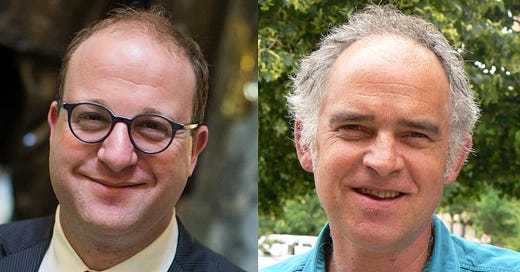




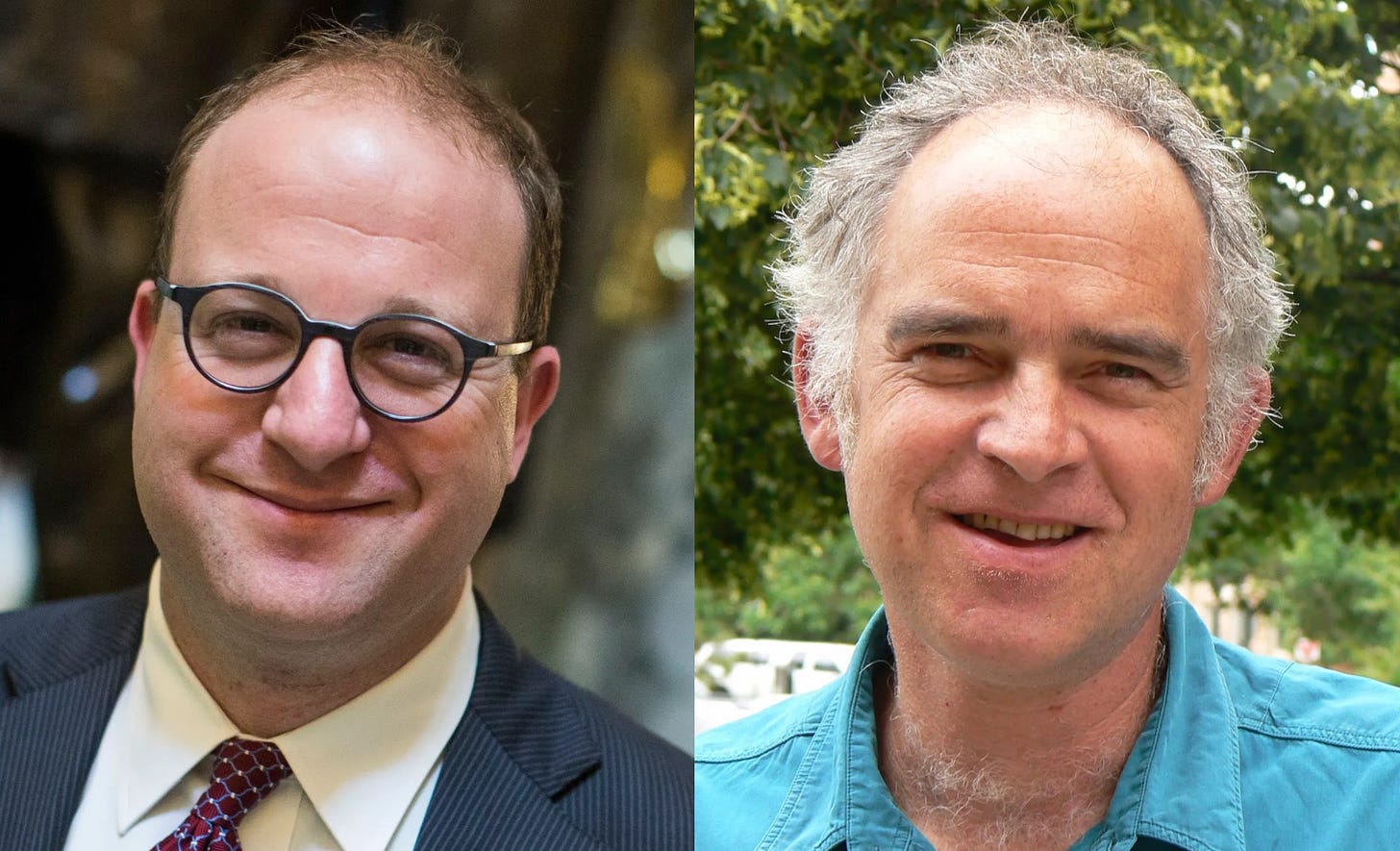


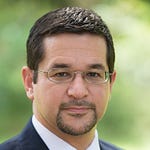

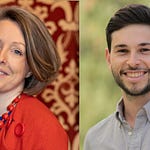

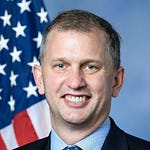


Share this post